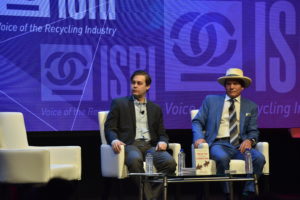“This is one of the talks where I don’t need to explain what hedging is,” says Spencer O. Johnson, Head of Ferrous Trading at StoneX Financial, in his opening remarks at the Ferrous Spotlight on the first day of ISRI2022. “Many of you are already doing that with zinc, copper, aluminum, precious metals, and bringing ferrous into the same risk management rubric has been in the works for a long time.”
Johnson was joined by George Adams, president of SA Recycling, on the session panel. Greg Dixon, CEO of Smart Recycling Management, served as the moderator. After discussing ferrous derivatives success stories Johnson reviewed factors impacting the ferrous marketplace.
“The big number to keep in mind when talking about metal iron and scrap is 60%,” Johnson says. That number accounts for iron and steel imports from Russia and Ukraine that can no longer be counted on because of the war in Ukraine. Johnson believes there will be substitutions for those imports—but there are limits. He anticipates the market will see more volatility and that in turn will impact recycled commodity prices.
He presented a chart comparing an assessment of the forward curve of recycled commodity prices Jan. 28 (before the Russian invasion of Ukraine on Feb. 24) and March 14. “The expectation for scrap prices was turned on its head by the situation in Ukraine,” he says.
Speaking as an “ops guy,” Adams discussed one of his company’s hard rules: Sell as much material as possible. “We don’t play the market, it’s as simple as that,”
Since his company has been part of many mergers and acquisitions, people have asked Adams about consolidation. Adams expects steel mills will continue to buy recycling yards.
 “People are going to want to own their own supply,” he says. “I think they’ll keep buying yards, but I also think there’s plenty of room in the market. We’re a big company and if we go into the market against a small, independent recycling yard, I know I’m never going to beat that guy; you can’t beat an entrepreneur running his own company.”
“People are going to want to own their own supply,” he says. “I think they’ll keep buying yards, but I also think there’s plenty of room in the market. We’re a big company and if we go into the market against a small, independent recycling yard, I know I’m never going to beat that guy; you can’t beat an entrepreneur running his own company.”
Adams discussed the three points of triangle model he uses in his career: to play to win; to never quit; and to live life like a bridge. Though the first two elements are straightforward, Adams provided some explanation to the third point.
“Let’s say you see a train with 10 engines and a bunch of cars heading straight toward a small bridge. You might think the small bridge can’t handle all those cars, but it can,” he says. “It’s because the bridge takes one car at a time.” He strongly recommends taking care of one problem at a time rather than dealing with them all at once, which could cause the bridge to collapse.
During the Q&A, Dixon asked Adams and Johnson to talk about how the war in Ukraine, inflation. and interest rates will impact the economy and what recyclers can do in response.
Johnson agreed inflation is a huge concern for everyone. While it’s unclear how many rate hikes there will be over the year, it’s already having real impacts. “We’re already seeing gas prices impacting the people with the lowest income, and that’ll be the case with food price inflation and energy price inflation,” he says. “I don’t think they’ll abate for a while. The outlook creates a lot of uncertainty and risk. But typically, high prices are usually the cure for high prices.”
Adams feels the industry has changed from working with a “just-in-time” inventory to a “just-in-case” inventory. “We used to buy only the equipment we needed for our companies,” he explains. “Whether it was computers, forklifts, anything. Now we’re buying extra because you don’t know when you’ll get them next. I think the shortages aren’t going away any time soon.”
Dixon turned the discussion to logistics, a constant concern for the industry. Adams recommended recyclers take a creative approach to the problem.
“You can’t take any prisoners,” he says. “Think outside of the box. You can’t only be open from 8 a.m. to 5 p.m., you need to think outside of the box. Trucking is a huge issue. So, load them at night, load them over the weekends,” he says
Johnson noted logistics is his clients’ main concern after price . “It’s an issue in every segment with every metal we deal with,” he says. “I think it has a huge impact on our ability to assess price because, at the end of the day, what is it worth if you can’t get the product? If you can’t get the product, then the price is a secondary concern.”
When asked about how electric vehicles (EV) may impact the industry, Adams noted that while his company isn’t currently getting many in the yards, there is a lot of concern. “Right now, [EVs] need to be taken apart by hand, and the battery needs to be removed before the vehicle can be shredded. It’s very labor-intensive.”
Johnson added that EVs will impact the demand for steel and impact the demand for recycled commodities. “Even if you don’t have an EV, you’ll want your gas-powered vehicle to be more efficient, which means substituting heavier products with lighter ones, and I think that’ll have a big impact for the steel and recycling industry going forward,” he says. “As we get a better grip on EVs in the yard, we’ll get a sense of the processes and what to do with that risk.”
Additional Resources













